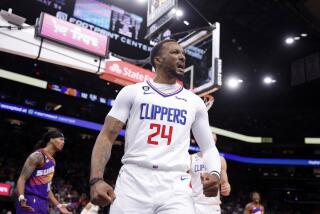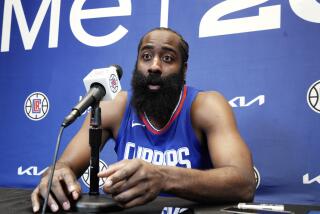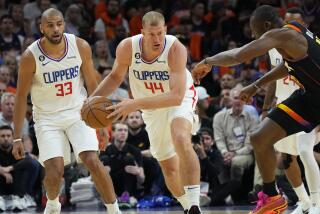Beyond His Years : In His Talent, Maturity and Concern for Others, the Clippers’ Terry Dehere Seems Nothing Like a Rookie
- Share via
Terry Dehere was excited as he entered his house in Jersey City, N.J., after basketball practice at Seton Hall.
“Ma, I’m going to the pros,” Dehere told his mother, Greta.
Greta Dehere thought her son was too ambitious. He had only begun college, and already he was dreaming of playing in the NBA.
“How do you know?” she asked. “That’s four years from now.”
But Dehere was determined.
“Terry knew what he wanted from day one and he just worked at it from a young age,” his mother said. “I always knew where Terry was. He’d come home from school and do his homework and as soon as he finished he’d take the ball and go straight out onto the court. He’d stay there until nightfall. He spent all his time on that court. I just had to look through the window and there he was, out there on the court.”
Dehere’s persistence paid off.
The 13th player selected in the NBA draft, Dehere signed a five-year, $6.5-million contract with the Clippers that could be worth as much as $8 million with incentives.
A 6-foot-4, 190-pound shooting guard, Dehere was voted Big East player of the year last season after passing former St. John’s star Chris Mullin to become the leading scorer in conference history with 2,294 points.
“I don’t want to go too far, but when all is said and done we’re talking about one of the best players in the history of this school,” Seton Hall Coach P.J. Carlesimo said of Dehere, who averaged 22 points, three rebounds and 2.7 assists in leading the Pirates to the Big East championship last season. “There is no limit to how far he can go as a basketball player. His best basketball is ahead of him.”
Dehere has impressed the Clippers in training camp.
Some rookies are intimidated by veteran players, but Dehere hasn’t been afraid to challenge veterans Ron Harper and Mark Jackson.
“He doesn’t back down,” Harper said. “He’s a good athlete, so you don’t have to teach him too much. He just needs to learn some things that the pro players do, all the small tricks that us older guys use. But I guarantee you that he’s going to be all right.”
Clipper captain Danny Manning agreed.
“Terry’s going to be a very good player in this league,” he said. “You can’t back down up here, and he realizes that.”
Dehere drew his first NBA technical foul in the Clippers’ 105-102 exhibition victory over the Milwaukee Bucks at the Sports Arena on Sunday, although it turned out to be a mistake.
Referee Jake O’Donnell later acknowledged that he erred in calling the technical.
“I have a reputation for being mean, but I’m not that mean,” O’Donnell said. “It was a mistake, and he won’t have to pay (the automatic $100 fine).
“All I heard was, ‘It was a wonderful call,’ and he was the nearest person around.”
Dehere also isn’t intimidated by taunting.
Selected by Clipper Coach Bob Weiss to shoot a free throw after a technical foul during a scrimmage, Dehere calmly made the shot as Jackson stood next to him, taunting in an attempt to distract him.
“He’s a city guy and he’s tough,” Jackson said. “He’s going to be in this league a long time, and he’s going to be successful.”
Weiss agreed.
“He’s got the attitude that he belongs,” Weiss said. “He doesn’t back down from anybody. He’ll get after guys and be the aggressor, which is a good thing.”
Clipper General Manager Elgin Baylor likes Dehere’s work ethic.
Dehere is usually the last player to leave the court, remaining after practice for extra shooting.
“He’s a workaholic,” Baylor said. “Everyone that’s ever been around him said he works harder than anyone.”
Dehere developed that trait because he was late bloomer in basketball. Baseball was his first love.
He developed into a home run hitter in Little League after his mother rewarded him with a new bicycle.
“He’d never hit a home run before,” Greta Dehere said. “So I said I’d buy him a dirt bike if he hit a home run. . . . Terry smacked that ball so hard that it went over the fence and while he was running the bases he pointed in the air and said, ‘Ma, there goes my bike.’
“I didn’t have the money, but I went out and got a bike with the credit card. I’ve never promised him anything since.”
Dehere, whose real name is Lennox Dominique Dehere Jr., got his nickname in Little League.
“He has an uncle named Terrance and they came to me in the hospital (when he was born) so fast that I didn’t have time to pick a name,” Greta said. “They said, ‘Give me a name now’ and I said, ‘I’ll name him after his father.’ But the name I really wanted to give him was Terrance. When he started playing games, we said we’ve got to give him a (nickname), so we started calling him Terry T, and the name stuck.”
Although he was a good baseball player, Dehere gave up the sport for basketball because he believed he could develop more quickly.
But he wasn’t an instant success on the court.
Dehere was usually the last player selected for neighborhood pickup games, if he was chosen at all.
“They didn’t fight over me,” Dehere said. “The fight was usually the other way, ‘We don’t want Terry.’ The only way I was able to play in games was to make a free throw at the beginning where I was able to choose sides as a captain. If I didn’t get to the front three of the line, usually two free throws had already been made and I’d never get a chance to take a shot and I’d never get picked. The only way I would be able to get picked was to make a free throw and pick myself.”
Dehere blossomed at St. Anthony High in Jersey City, where he played alongside Duke guard Bobby Hurley, the Sacramento Kings’ No. 1 draft pick.
“If you had told me Bobby Hurley was going to be in the NBA, that was almost a given,” Dehere said. “If Bob and myself had had a conversation back then, it would have been, ‘What do you think Bob will do when he gets to the NBA?’ ”
Dehere, who was so skinny that he was nicknamed “Rubber Band Man” in high school, developed more slowly than Hurley, who started as a freshman on a team coached by his father, Bob, and led St. Anthony to four consecutive state titles.
“When Terry was a freshman, he wasn’t good enough to be on the junior varsity and he played on the freshman team,” Coach Hurley said. “He was so skinny that he was like Gumby. He had pencil-thin legs.”
After playing on the JV team as a sophomore, Dehere was the sixth man on the varsity as a junior. But he excelled as a senior, averaging 13 points as St. Anthony went 32-0 and finished the season as USA Today’s No. 1 team.
“Coach Hurley was really hard on me,” Dehere said. “He’d talk to a 16-year-old as if you were someone his own age. I thought he was picking on me. I didn’t understand it then, but everything he said to me back then that I rebelled against stuck in my mind and I used it in college.”
Carlesimo signed Dehere after scouting him in summer camps. Because Seton Hall had been weakened by graduations after losing to Michigan in the 1989 NCAA championship game, Dehere started as a freshman, leading the Pirates with a 16.1 average in 1989-90.
“Seton Hall was the first big school to come in and he felt most comfortable with them,” Coach Hurley said. “I didn’t know what they were getting. I thought as time went by he’d be a good college player, but I didn’t feel he’d improve this much.
“He’s like Bobby because they play all the time. The thing that helped Terry get better was that he didn’t have early success, which is a much more motivating thing. Plus, he has a real love of the game. A lot of kids treat it as something that they just do. He loves to play. That’s why he’s been successful.”
Dehere would like to help those in his hometown who aren’t as successful as he.
He formed the Terry Dehere Foundation with Robert E. Brennan, chairman of the Seton Hall Board of Regents. The Foundation aims to keep guns from teen-agers in Jersey City and halt drug-related violence.
Brennan, who owns several race horses, named a 2-year-old colt after Dehere. All of the colt’s winnings will go to the Foundation and Brennan guaranteed the first $1 million to ensure that the Foundation gets off the ground. It should prosper; Dehere the colt is the future book favorite to win the Kentucky Derby.
“Inner-city violence is a big problem, especially where I’m from,” Dehere said. “Handguns are the main killers, and we’re trying to get handguns out of the hands of people who don’t really need them. A lot of people have tried before and haven’t been successful. You’re not going to take a gun away from someone who has plans to rob a bank or rob a store. But some people I know buy guns just to say they have them.
“If we do this right, maybe we can retrieve those guns, because those are the guns that kill people.”
If Dehere can accomplish that, it will give him as much satisfaction as reaching the NBA.
More to Read
Go beyond the scoreboard
Get the latest on L.A.'s teams in the daily Sports Report newsletter.
You may occasionally receive promotional content from the Los Angeles Times.






